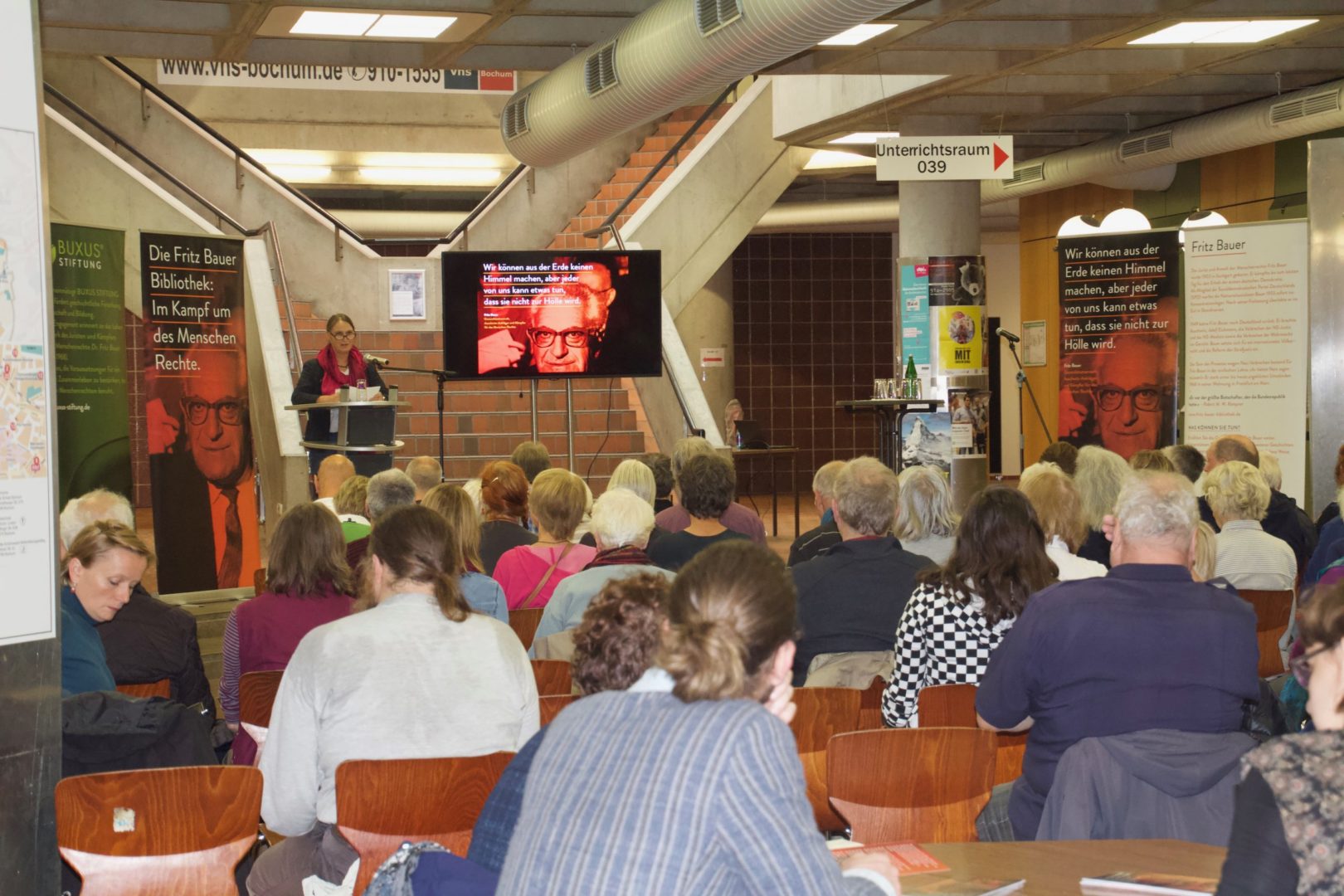06.10.2019
Interactive Fritz Bauer Library launched
The prelude of a new voice “In the struggle of human rights”
In Bochum there is a living culture of remembrance. As a co-founder and some years chairwoman of the association “Remembering for the Future” I have a lot in common with this history.
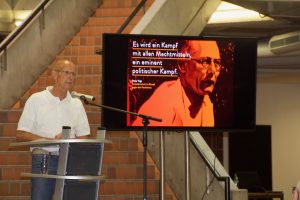 The question that always confronts me anew – what makes people commit themselves to human rights – is no less topical. All the more reason for me to be delighted that we have managed this project. After a year of intensive efforts, the Fritz Bauer Library, with stories of resistance and survival, started off with an event in Bochum. In the spirit of the lawyer Fritz Bauer, who brought Auschwitz, the crimes of Nazi justice, the Wehrmacht and Nazi medicine to justice, we are opening up new paths for the culture of remembrance “In the struggle of human rights” (Fritz Bauer).
The question that always confronts me anew – what makes people commit themselves to human rights – is no less topical. All the more reason for me to be delighted that we have managed this project. After a year of intensive efforts, the Fritz Bauer Library, with stories of resistance and survival, started off with an event in Bochum. In the spirit of the lawyer Fritz Bauer, who brought Auschwitz, the crimes of Nazi justice, the Wehrmacht and Nazi medicine to justice, we are opening up new paths for the culture of remembrance “In the struggle of human rights” (Fritz Bauer).
Many individuals and initiatives participated and prepared the event, especially the Bochum “Bündnis gegen Rechts”. It is fantastic and certainly not self-evident. The VHS supported the project from the very beginning, the municipal library made its rooms and holdings available, with selected works for the special occasion, and the Zentrum für Stadtgeschichte set up direct online access to its archives. The Kinder- und Jugendring e.V. and “Demokratie leben!” sponsored the event.
Bochum’s head of the culture department, Dietmar Dieckmann, warmly welcomed the numerous participants. Dr. Monika Hauser, who with medica mondiale e.V. is a campaigner for women’s rights without fear of costs and personal effort, gave the opening speech. The award winner of the Alternative Nobel Prize presented the important work of medica mondiale e.V., where there are many personal points of contact for our library. The interactive Fritz Bauer Library is a voice for human rights organisations whose work confronts them daily with stories of resistance and survival. What this means was made clear by the Bochumer Theater Traumbaum with its current interventions. What, for example, will future generations say about us when it comes to the people who drown in the Mediterranean Sea fleeing violence and starvation because we do not help them?
The tasks and potential of the interactive library for human rights organisations were made evident
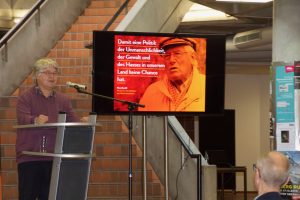 The event made clear the diversity of the stories of resistance and survival. And it pointed out the many opportunities that the Fritz Bauer Library opens up in the network of human rights organisations.
The event made clear the diversity of the stories of resistance and survival. And it pointed out the many opportunities that the Fritz Bauer Library opens up in the network of human rights organisations.
– The stories are historically, politically and geographically relocated and can be researched worldwide in the larger context of the struggle for human rights.
– The stories are filed in a worldwide accessible and evaluable relational database.
– The stories and persons are given a protective shelter under the name of the renowned lawyer, Holocaust survivor and human rights campaigner Dr. Fritz Bauer.
– The stories are actively integrated and networked in human rights education.
The idea for this originated in the context of our culture of remembrance, which for some time now has been accompanied by an “uneasiness” (Aleida Assmann). What does it mean when the contemporary witnesses of the Holocaust no longer accompany us, is one of the worrying questions. After all, the survivors of the Holocaust are both warners and reminders.
More provocatively formulated: Have we learned from history? Are we prepared today to oppose anti-Semitism, racism and nationalism, to actively combat them, as is currently necessary? Or are we astonished, not to say surprised, to what extent we are now experiencing racism, nationalism and, as its other side, anti-Semitism again in Germany, but also in Europe and the USA?
I am not sure that we are sufficiently well prepared. There are several reasons for this, one of them is that the survivors did not always warn us in vain with their “Never again!” that history does not repeat itself, but that social relationships in crisis situations – and we live in a time of crisis – can change from one day to the next. Hannah Arendt said that neighbours and friends can become opponents or enemies with almost unbelievable speed. We should not forget that.
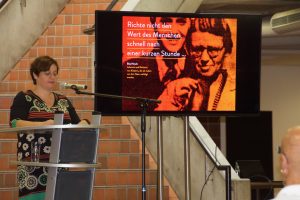 Another reason for the skepticism is that we are probably not sufficiently strengthened in our resistance forces against racism, nationalism and anti-Semitism solely by “remembering crimes”, i.e. by documenting what we have learned to respect as our negative memory.
Another reason for the skepticism is that we are probably not sufficiently strengthened in our resistance forces against racism, nationalism and anti-Semitism solely by “remembering crimes”, i.e. by documenting what we have learned to respect as our negative memory.
To express this in the spirit of the lawyer Dr. Fritz Bauer:
Remembering only is not enough, but an active “No!” is called for when injustice happens and human dignity is violated. He is concerned about the right and duty to resist when human rights are violated. For him, that was the meaning and purpose of the Nazi trials: You should have had to say no! After all, everyone would have been obliged to help and save the lives of the persecuted Jews, the Sinti and Roma, Communists, Social Democrats, Christians, the handicapped or so-called asocials, all those who had been degraded by the National Socialists to being subhumans, marginalised and declared lawless.
But what does that mean for us today, for our historiography and our culture of remembrance, as cultivated in schools, universities, justice, medicine and politics? In the spirit of Fritz Bauer, I would say like this: there is no neutrality towards violated human dignity.
A living archive of fellow humanity “In the struggle of human rights”
One sentence of Fritz Bauer did not only convince me: “We can’t make heaven out of the earth, but each of us can do something that it won’t become hell”. We all can do something to make our world a little better and more just. There are also enough role models for it, but we notice them far too little and there is far too little talk about them. In this context the American psychologist Eva Fogelman quotes Rabbi Harold Schulweis with the rebellious question and answer: “Which code of ethics argues that evil be allowed to eclipse the good? Which perverse logic holds that we obliterate the memory of man’s nobility so as to preserve the memory of his degeneracy? In unearthing the crimes of villainy, the virtues of humanity must not be buried.”
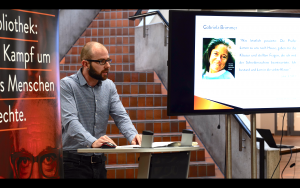 This is what we want to achieve and transform through the interactive library. It will make it clear that it is up to us, up to each individual, to create the conditions so that the good can grow in humankind and that there are many people who have done this and continue to do so.
This is what we want to achieve and transform through the interactive library. It will make it clear that it is up to us, up to each individual, to create the conditions so that the good can grow in humankind and that there are many people who have done this and continue to do so.
When I told him about our project, UNESCO Assitent Director Frank La Rue – himself a survivor of the civil war in Guatemala – asked, “Could there be a more important database than the one that tells the stories of people who have oftentimes given their lives for this world?”
That is why we invite everyone to contribute to this narrative in the future. Explore, research, film and tell with us the story of the search for justice. Let us create a living archive of humanity, because only in this way the resistance “In the struggle for human rights” remains alive.
All initiatives and institutions we would like to thank: Bochumer “Bündnis gegen Rechts”, bo-alternativ, VHS-Bochum, Zentrum für Stadtgeschichte Bochum, Stadtbibliothek Bochum, Philippinenbüro e.V., GLS Zukunftsstiftung Entwicklung, Vereinigung der Verfolgten des Nationalsozialismus Bochum, Seebrücke Bochum, Amnesty International, Geschichtswerkstatt Bochum, “Demokratie leben!”, Kinder- und Jugendring e.V., Theater Traumbaum Bochum, medica mondiale e.V.
Author: PD Dr. Irmtrud Wojak, Managing Director of the BUXUS STIFTUNG, Initiator of the interactive Fritz Bauer Library
Contact: info@fritz-bauer-blog.de
Photos: BUXUS STIFTUNG gGmbH, Header: Opening of the event by Gabriele Fuchs (VHS Bochum); Fig. 1: Uli Borchers (Bochumer “Bündnis gegen Rechts”) presents the history of Franz Vogt; Fig. 2: Volker Gerwes (Geschichtswerkstatt Bochum) presents the history of Klaus Kunold; Fig. 2: The history of the Vogt family; Fig. 2: The history of the Vogt family. 3: Daniela Collette (Seebrücke Bochum and Bochumer “Bündnis gegen Rechts”) presents the story of Else Hirsch; Fig. 4: Stefan Schuster, MA presents the story of Gabriela Brimmer.
Graphic design: Detlef Behr, Cologne (designbuerobehr.de)




